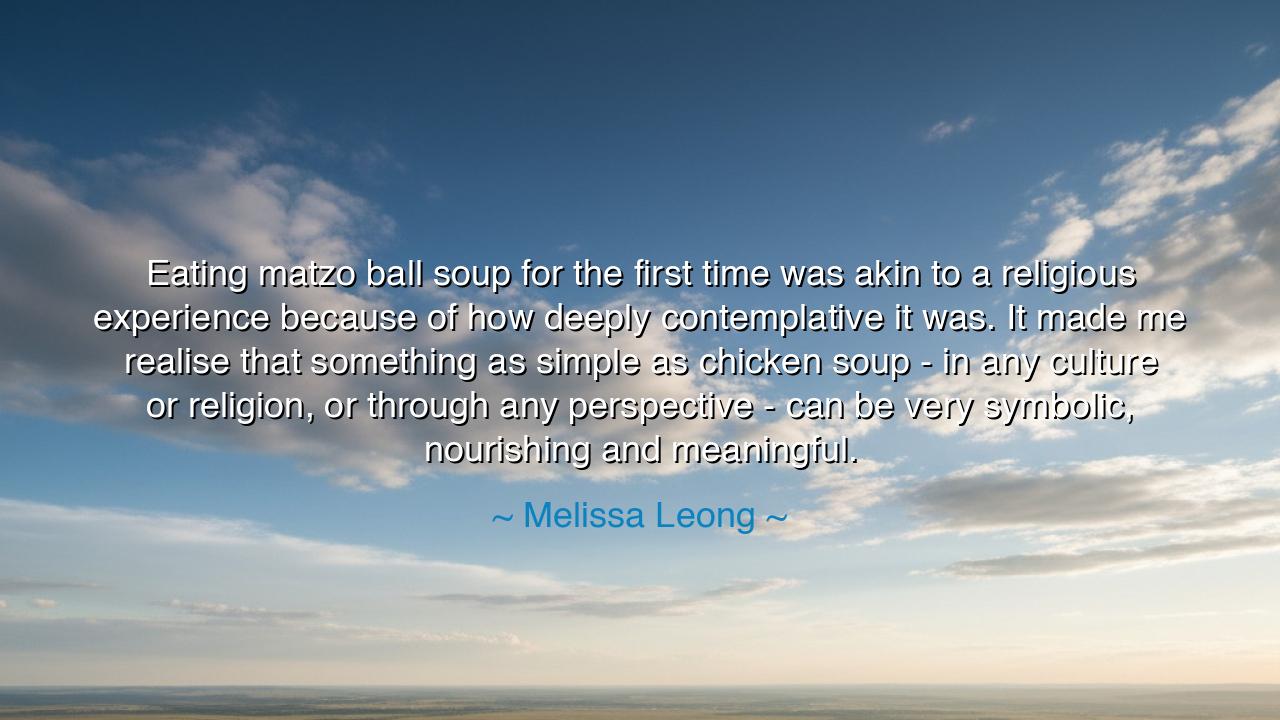
Eating matzo ball soup for the first time was akin to a religious
Eating matzo ball soup for the first time was akin to a religious experience because of how deeply contemplative it was. It made me realise that something as simple as chicken soup - in any culture or religion, or through any perspective - can be very symbolic, nourishing and meaningful.






In the quiet moments of life, sometimes it is the simplest of experiences that bring us closest to the sacred. Melissa Leong speaks of this profound realization with her words: "Eating matzo ball soup for the first time was akin to a religious experience because of how deeply contemplative it was. It made me realise that something as simple as chicken soup—in any culture or religion, or through any perspective—can be very symbolic, nourishing and meaningful." Here, Leong reveals a deep truth: that the most ordinary moments, the ones we might take for granted, can hold within them the power to touch the divine. A bowl of soup, shared and savored, becomes not just food for the body, but food for the soul, nourishing in ways beyond the physical.
This idea is not a new one. The ancients understood the symbolic power of food and ritual. In many cultures, food was not just sustenance but a way to connect to the gods, to ancestors, and to the spirit of the community. In ancient Greece, the offerings of food and wine to the gods were a means of seeking favor and of honoring the divine. The shared meal in the Homeric epics was more than just an act of feeding; it was an act of bonding, of ritual, and of reflection. When Odysseus and his men shared a meal, it was a moment of connection, not only to each other but to the greater forces that shaped their lives. The ancient Hebrews, too, understood the sacredness of food. Passover, with its matzo, bitter herbs, and lamb, was not just a meal—it was a reminder of the journey from slavery to freedom, an act of both sustenance and commemoration.
Leong’s reflection on matzo ball soup takes us into this ancient tradition, showing how even the simplest foods can carry with them layers of meaning. Matzo ball soup, a dish rooted in Jewish tradition, is far more than just a meal; it is a symbol of heritage, memory, and connection. For Leong, the first experience of tasting this dish became a moment of contemplation, allowing her to see how food can embody the values and history of a people. The act of eating becomes a sacred ritual—a moment where nourishment transcends the physical, offering us the chance to reflect on the deeper meanings of life.
This brings to mind the story of Jesus at the Last Supper, where the act of sharing bread and wine with his disciples was not just a meal, but a profound symbol of unity, sacrifice, and redemption. The bread, broken and shared, became a symbol of Christ’s body; the wine, his blood. This ritual of eating and drinking transcended the simple act of sustenance—it became a means of connecting to the divine and understanding the mysteries of life, death, and resurrection. In the same way, the matzo ball soup Leong speaks of becomes more than just food; it is a ritual that connects her to a greater tradition, one that holds within it history, faith, and the continuity of a people.
Through Leong's experience, we are reminded that simple things—whether they are a bowl of soup, a piece of bread, or a shared meal—can hold deep meaning. These moments, often overlooked in their ordinariness, are where the divine touches the earth. They are invitations to pause, to reflect, and to recognize the sacred in the most mundane aspects of life. Food, in its most elemental form, is a reminder that we are connected—to our history, to our culture, to each other, and to the divine. Each bite, each flavor, carries with it a history that is both personal and collective, nourishing not only the body but also the soul.
The lesson here is clear: we must learn to slow down, to appreciate the simple, everyday moments that we often overlook. In the rush of life, we forget that the act of eating, the act of sharing a meal, can be a ritual, a moment of connection to something larger than ourselves. Let us approach every meal with gratitude and awareness, recognizing the symbolism of what we are consuming and the deeper meanings it carries. Like Leong with her first taste of matzo ball soup, we too can find moments of contemplation and meaning in the most ordinary experiences if we are open to seeing them through a deeper lens.
So, let us live with awareness, understanding that even the most simple and mundane moments of life can carry sacred significance. In each meal, in each shared experience, let us find the opportunity to connect to something greater—whether it be heritage, faith, or the shared bonds that unite us all. By embracing the symbolism of what we eat, we honor not only our bodies but the deep, sacred connections that food and ritual offer. In doing so, we elevate our everyday lives and open ourselves to the divine that exists in the world around us.






AAdministratorAdministrator
Welcome, honored guests. Please leave a comment, we will respond soon